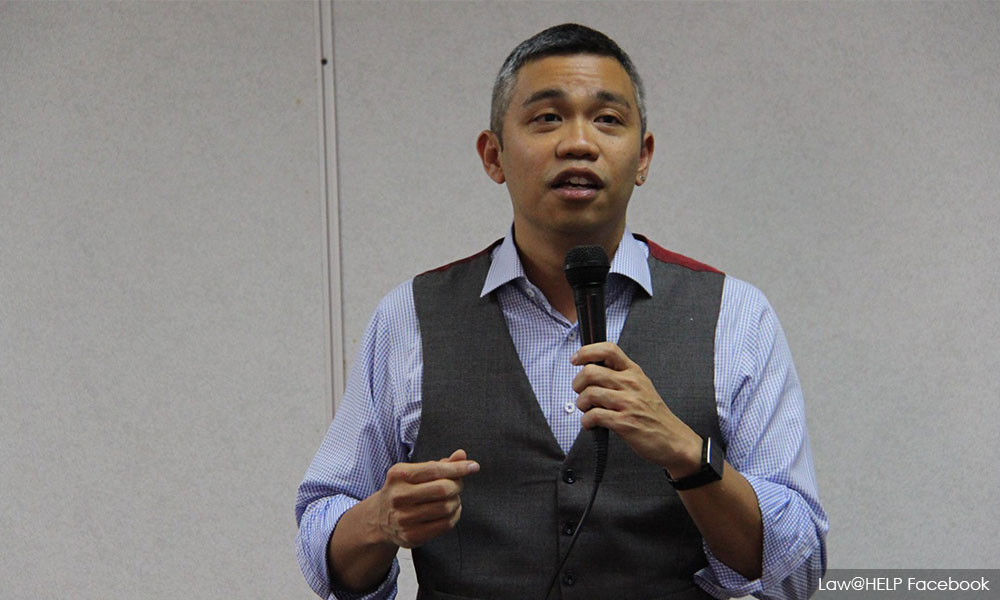A woman wishing to live her life would be forced to leave Malaysia if she loses her legal bid to leave Islam, the Court of Appeal heard today.
Her lawyer Fahri Azzat submitted that this is what his 33-year-old client would have to do if she keeps losing her appeal to be given an opportunity to argue on the merits of her judicial review.
The lawyer said the Eurasian woman ought to be granted leave to commence the judicial review as the Kuala Lumpur High Court last year erred in ruling that a civil court has no power to grant judicial review leave on renunciation issues.
Fahri told the three-person Court of Appeal bench chaired by judge Azizah Nawawi that the woman could not afford to lose “5-0” at the appeal stage as she ran out of money during the legal proceedings, and that he had to represent her on a pro bono (legal service for free) basis.
The lawyer’s “5-0” was referring to the various stages of legal proceedings that the woman had to undergo: the Federal Territory Syariah High Court dismissed her bid to leave Islam and embrace Confucianism and Buddhism; the Federal Territory Syariah Appeal Court denied her appeal to leave Islam; the Kuala Lumpur High Court (civil) denied leave for her to commence judicial review over the Syariah Court’s decision-making process; as well as the hypothetical scenario if she loses her appeal at both the Court of Appeal and then the Federal Court.
“This is very important to her. If (she loses) 5-0, then I have to tell her she has no freedom of religion.
“If she wants to live her life, then I would need to tell her to get out (of Malaysia), that is what she would have to live with.
“This (civil court appeal) is her last port of call. If we cannot even get in the door to argue on the merits (of the judicial review before the Kuala Lumpur High Court), if it is knocked out over jurisdiction (issue), then what other remedy she has left?” Fahri said, begging the bench to give her a chance and grant leave.
The lawyer added that case laws support their contention that the civil court is the superior court to the Syariah Court as the former was enacted from the Federal Constitution while the latter is a creature of state laws.

The woman’s appeal hearing today was against Kuala Lumpur High Court judge Ahmad Kamal Md Shahid’s decision on June 15 to dismiss her judicial review leave application (if a civil court grants leave, it would later set a different date to hear arguments on the merits of a judicial review).
However, during the Court of Appeal proceedings, the government’s legal representative, senior federal counsel (SFC) Ahmad Hanir Hambaly @ Arwi countered that Article 121(1A) of the Federal Constitution bars the civil courts from encroaching on matters such as renunciation that falls squarely within the syariah court’s jurisdiction.
The SFC pointed out that the woman herself in her affidavits does not deny that she was born a Muslim to Muslim parents in Johor in 1990.
‘Syariah courts made proper rulings’
Hanir argued that both levels of the syariah judicial system had looked at the evidence presented by the woman and made proper rulings to deny her bid to renounce Islam, thus the civil court has no need to intervene in the matter.
“Their (woman’s legal team) core contention is that the civil court can judicially review the decision of the Syariah Court if there had been irrationality and irregularity. If that is the situation, then all decisions by the Syariah Courts would be subject to judicial review (by the civil court), such as in nafkah (alimony to ex-spouse) and child (custody in Islamic divorce cases), then it would be discriminatory to Muslims.
“This is because they have to go to the Syariah High Court and Syariah Appeal Court, then they can still challenge (the Syariah Court decisions by going to the civil courts that comprised the High Court, Court of Appeal and Federal Court),” Hanir contended.
At the end of proceedings this afternoon, the Court of Appeal bench set Aug 28 to decide on whether to allow the woman’s appeal to get leave to proceed with her judicial review.
The other members of the bench are judges See Mee Chun and Azizul Azmi Adnan. The woman was not present during the open-court proceedings.
The woman’s judicial review bid named the Federal Territory Syariah Appeal Court, the Federal Territory Syariah High Court, the Federal Territory Islamic Religious Council (MAIWP), and the government as first, second, third, and fourth respondents.
On March 4 last year, she went to the civil court to nullify the syariah court’s refusal to allow her renunciation bid.

According to the civil action cause papers, the woman, born to a Muslim convert man and a Muslim-born woman on Feb 8, 1990, allegedly went through a multi-year failed bid at the syariah courts to leave the religion and officially take on Confucianism and Buddhism.
She claimed the Syariah High Court and Court of Appeal refused her bid as they held it would go against hukum syarak (Islamic principles) to allow a fellow Muslim to leave the faith.
The woman - whose parents have since divorced - claimed her Muslim mother never forced Islam on her and gave her free rein to determine her own faith.
She claimed her father only converted to Islam in order to marry her mother and that her parents never practised the faith.
Contending that she neither practised Islam nor even recited the kalimah syahadah, she initially went to the Federal Territory Syariah High Court to try to renounce Islam.
The kalimah syahadah - one of the Five Pillars of Islam - is an Islamic oath that reads “I bear witness that there is no deity but God (Allah), and I bear witness that Muhammad is the messenger of God.”
The woman alleged that on Dec 10, 2018, the Syariah High Court ordered her to attend 12 pre-trial aqidah (faith) counselling sessions for a six-month period beginning Jan 14, 2019.
She said she then took leave from her employment in Oman and flew back to Malaysia to attend the 12 sessions which in the end managed to be completed between Jan 14 and 25 that year.
The woman claimed her mother and her mother’s close friend testified before the Syariah High Court over her faith in Confucianism and Buddhism.
She alleged however that on July 27, 2020, the Syariah High Court dismissed her bid and instructed her to undergo istitabah under MAIWP or the “Mufti’s Office”.
Under the country’s syariah system, istitabah refers to faith rehabilitation.
She claimed that the court also ordered her to undergo continuous Islamic classes as well as more aqidah counselling. - Mkini




No comments:
Post a Comment
Note: Only a member of this blog may post a comment.